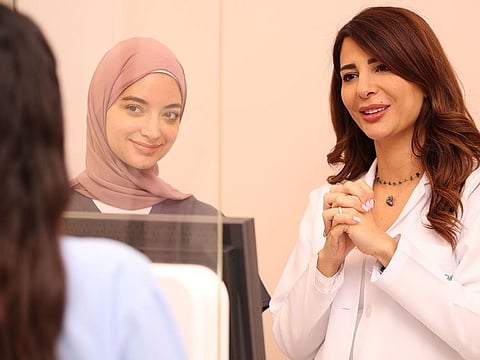How Clemenceau Medical Center Hospital in Dubai tackles breast cancer with its multidisciplinary approach
From screening to reconstructive surgery, the hospital offers a holistic suite of services

One in eight women in the UAE will develop breast cancer in her lifetime, and the women affected are now increasingly in their 40s and even late 30s, says Dr Tatiana Khoury, who leads the Breast Care Unit at the Clemenceau Medical Center Hospital in Dubai (CMC Hospital Dubai).
“These are women in the prime of their lives, peak of their careers, who have children dependent on them,” says Dr Khoury, a specialised breast radiologist. “This is an enemy that we cannot run from, and the best solution we have is catching the cancer early – if you catch it stage one or two, the survival rate is close to 100 per cent.”
Catching it early and saving these lives, however, requires a holistic, multidisciplinary approach that takes into consideration every aspect of these women’s well-being. “Every patient is unique – the composition of each woman’s breast is unique like a fingerprint, and so are her family history and her risk factors,” she says. “The care must be tailored to each patient; it’s a very dynamic process that we follow at the Breast Care Unit.”
The highly specialised team includes radiologists, oncologists, breast oncoplastic and reconstruction surgeons, and offers genetic screening, the latest in imaging services, and cutting-edge reconstructive surgery as part of a cohesive treatment process.
And at every step, the specific needs of the women, physical and mental, are the main focus, beginning with screening. “Genetic testing for breast cancer can either be for BRCA 1 and BRCA 2 that can lead to an increased risk of breast/ovarian cancers, or for mutations in breast cancer tumours that can help us choose the most effective treatments,” says Dr Deborah Mukherji, Medical Oncology Consultant at CMC Hospital Dubai.
“These tests are highly accurate, but we always offer genetic counselling before the test to ensure that the patient is aware of all potential implications of the test results for themselves and their families.”
The same goes for imaging tests. The mammogram is the gold standard, of course, but the process involves much more than just simply doing a scan. “When we do the mammogram, we map the composition of the breast. The denser the breast, the more mammary glands there are, and the mammogram will have limitations as these glands might obscure small masses. I always inform women about their breast density so they’re aware,” explains Dr Khoury.
The latest 3D mammogram technology available at CMC Hospital Dubai reduces these limitations, but not entirely. “It's the job of the radiologist to decide that this patient might benefit from additional imaging, such as the breast ultrasound,” she says. And radiologists at CMC Hospital Dubai are trained to make that judgement call.
Similarly, with the use of the 3 Tesla MRI, the most advanced imaging technique available, the radiologist needs to make a careful choice. “We go through a woman’s family history, and a questionnaire that determines her risk for breast cancer, and if they are high risk, according to our criteria, we might offer them the MRI as additional screening. Because it’s highly sensitive but not specific for cancer, there is a chance of false positives, but in these high-risk patients, it's worth doing,” she explains.
If the patient requires a biopsy, in most cases, it’s no longer a surgically invasive process. Instead, biopsies are now done using the imaging modalities such as mammograms, ultrasounds and MRIs. “The ultrasound-guided biopsy, which is the easiest one, takes me 10 minutes or less,” says Dr Khoury. “There is only a tiny incision on the skin that doesn't even need stitches and will heal in a day.”
Eighty per cent of these biopsies will end up reassuring the woman that the mass is benign, she says. But for the other 20 per cent, the oncologists on the team are equipped with the latest treatments based on these diagnostics.
“These include chemotherapy, immunotherapy, targeted therapy, hormone therapy, and of course, surgery based on the specific case,” says Dr Mukherji. “Overall, over 90 per cent of patients with breast cancer can be cured, especially when caught at an early stage.”
One of the most difficult parts of recovering from breast cancer is surgery. But surgical methods have evolved tremendously in the past couple of decades, especially with oncoplasty, where the principles of cosmetic surgery are combined with cancer surgery, explains Dr Mahmoud Abu Dakka, Consultant Oncoplastic and Reconstructive Breast Surgeon at CMC Hospital Dubai.
“This allows us to provide our patients a safe oncological resection of the tumour while maintaining the function of the breast as an aesthetic and feminine organ.”
These advances include immediate breast reconstruction where the patient has the mastectomy (breast removal) and the reconstruction at the same time allowing for “the best onco-cosmetic outcomes”. Patients also have multiple options for the type of reconstruction, whether it is autologous reconstruction where tissue from the belly or other parts are placed in the breast, or implant-based reconstruction, using the latest in gel/silicon breast implants and breast reconstruction meshes.
“There has been a massive shift of breast reconstruction towards the implant-based, mesh-assisted reconstruction, which offers a shorter operating time and faster recovery,” says Dr Dakka.
There is a world of technology available today to help diagnose and treat breast cancer. All women need to do is take the first step and get tested once they reach the age of 40. “Women tend to put their health and their needs in second place,” says Dr Khoury. “But as a woman, you are the basis of everything, and you have to maintain your physical and mental well-being.”
This content comes from Reach by Gulf News, which is the branded content team of GN Media.